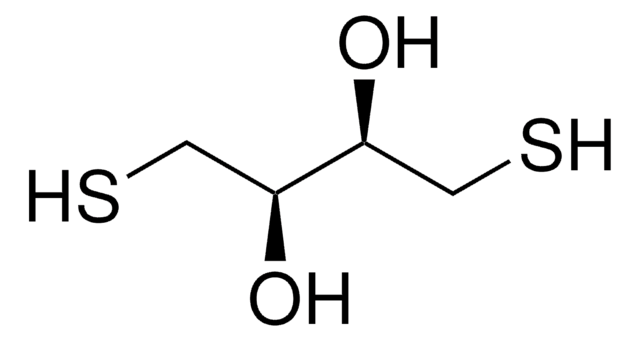D5545
DL-Dithiothreitol
BioXtra, ≥99.0% (titration)
Synonym(s):
threo-1,4-Dimercapto-2,3-butanediol, Cleland’s reagent, DTT
About This Item
Recommended Products
product line
BioXtra
Quality Level
Assay
≥99.0% (titration)
form
powder
reaction suitability
reagent type: reductant
impurities
Insoluble matter, passes filter test
≤0.3% 4,5-dihydroxy-1,2-dithiane
pH
4.0-6.0 (20-25 °C, 0.1 m in H2O)
mp
41-44 °C (lit.)
solubility
H2O: 0.1 M, clear, colorless
anion traces
sulfate (SO42-): ≤0.005%
cation traces
Al: ≤0.0005%
As: ≤0.0001%
Ba: ≤0.0005%
Bi: ≤0.0005%
Ca: ≤0.001%
Cd: ≤0.0005%
Co: ≤0.0005%
Cr: ≤0.0005%
Cu: ≤0.0005%
Fe: ≤0.0005%
K: ≤0.005%
Li: ≤0.0005%
Mg: ≤0.0005%
Mn: ≤0.0005%
Mo: ≤0.0005%
Na: ≤0.1%
Ni: ≤0.0005%
Pb: ≤0.0005%
Sr: ≤0.0005%
Zn: ≤0.0005%
absorption
≤0.100 at 280 in H2O at 0.1 M
≤0.400 at 260 in H2O at 0.1 M
storage temp.
2-8°C
SMILES string
O[C@H](CS)[C@H](O)CS
InChI
1S/C4H10O2S2/c5-3(1-7)4(6)2-8/h3-8H,1-2H2/t3-,4-/m1/s1
InChI key
VHJLVAABSRFDPM-QWWZWVQMSA-N
Looking for similar products? Visit Product Comparison Guide
Application
Signal Word
Danger
Hazard Statements
Precautionary Statements
Hazard Classifications
Acute Tox. 4 Oral - Eye Dam. 1 - Skin Irrit. 2
Storage Class Code
11 - Combustible Solids
WGK
WGK 2
Flash Point(F)
Not applicable
Flash Point(C)
Not applicable
Personal Protective Equipment
Choose from one of the most recent versions:
Already Own This Product?
Find documentation for the products that you have recently purchased in the Document Library.
Customers Also Viewed
Our team of scientists has experience in all areas of research including Life Science, Material Science, Chemical Synthesis, Chromatography, Analytical and many others.
Contact Technical Service





